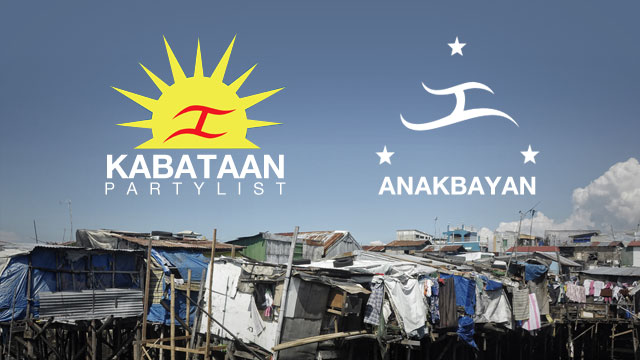SUMMARY
This is AI generated summarization, which may have errors. For context, always refer to the full article.

MANILA, Philippines – Informal settlers found an ally in militant youth groups.
On June 25, Anakbayan, Kabataan party list, and other youth groups rallied in front of the Department of Interior and Local Government (DILG) to protest against what they called the ‘all-out demolition’ of Metro Manila’s informal settlers.
The Aquino administration plans to demolish the houses of over 104,000 families near major waterways.
Kabataan Partylist representative Teddy Ridon said that the Aquino administration’s plan only aims to cover up the government’s long standing neglect of flood control.
Ridon maintained that estero dwellers are the victims rather than the cause of flooding.
“It is a grave injustice to make the downtrodden suffer by serving as the government’s convenient scapegoat for its neglect on flood control,” he added.
Ridon cited scientific studies that show the major causes of flooding.
In 2006, University of the Philippines (UP) professors Kelvin Rodolfo and Fernando Siringan conducted a study in order to find out the cause of worsened flooding in Metro Manila. Results pointed to the excessive use of groundwater that causes land to gradually sink.
The researchers also pointed out that some multimillion government flood control projects did not serve their purpose and only became sources of large-scale corruption.
Ridon said that government efforts favored short-term contingencies over efficacy.
“Instead of scientifically addressing the issue of intensifying floods in Metro Manila, it seems that the government is content with putting all the blame to estero dwellers while continuing inefficient flood control projects that are major sources of funds for corrupt politicians,” Ridon said.
‘Crime against humanity’
Anakbayan partylist called the planned demolition a crime against humanity. They cited the Rome Statute of the International Criminal Court.
The document defined crimes against humanity as “particularly odious offenses in that they constitute a serious attack on human dignity or grave humiliation or a degradation of human beings.”
Anakbayan national chairperson Vencer Crisostomo said that informal settlers should be treated in a humane way. “They are stripped of their homes and jobs with not a single thought, as if they were second-class citizens, or worse, non-humans,” Crisostomo said.
Ridon said that the P18,000 ‘rental subsidy’ offered by the government to the informal settlers is a scheme to circumvent the Urban Development and Housing Act of 1992.
Republic Act 7279 or the Urban Development and Housing Act of 1992 allows the demolition of houses occupying danger areas such as canals, railroad tracks and waterways.
The law, however, states that resettlement areas will only be considered if “the degree of availability of basic services and facilities, accessibility and proximity to job sites and other economic opportunities” are present.
Crisostomo maintained that monetary support is not sustainable.
“What is the use of P18,000 if they will lose their sources of income? Making ends meet is already hard enough with Aquino allowing prices of basic goods and services to rise left and right,” Crisostomo said.
He added that the money given is not enough. “And where in the Philippines does Noynoy expect the urban poor to rent houses at P1,500 a month?,” Crisostomo asked.
Crisostomo also noted that human rights organizations have recorded the murder of 10 anti-demolition activists and 8,336 cases of forced demolitions in Aquino’s first two years in power.
Definite plans
In a press conference on the same date, deputy presidential spokesperson undersecretary Abigail Valte said that relocating the informal settlers is the only way to go.
“There is no choice but to move them because, in the first place, delikado po talaga ‘yung mga tinatayuan ‘nung kanilang mga structures,” Valte said. (There is no choice but to move them because the areas where their structures stand are really dangerous.)
Valte said that the government had long been allotting funds for the relocation projects. “Nagtabi na po ng P10-billion… It’s a big undertaking but inaral naman po nang mabuti lalo na po ‘yung funding requirement,” she added. (We already allotted P10 billion. It’s a big undertaking, so we’re carefully studying the factors, especially the funding requirements.)
The informal settlers will be relocated in different sites. Valte maintained that the residents were given consulted.
“The informal settler communities were given a choice kung saan po ‘yung pipiliin nilang relocation…Meron po talaga ‘yang matitira dito sa lungsod, meron pong mas malapit doon sa mga dati nilang tinitirhan, at meron namang…pumayag nang lumipat off-site,” she added. (The informal settler communities were given the choice of where they would be relocated. Some will stay in the city, some will be relocated near their old houses and some will be relocated outside the city.)
Valte disproved the partylists’ claims and maintained that the welfare of the people remains top priority.
“Ang focus po kasi ay ‘yung tungkulin po ng gobyernong tulungan sila at bigyan sila ng pagkakataon na maka-angat naman po sa buhay,” Valte said. (The focus of the government is to help the informal settlers. We want to give them the opportunity to have better lives.)
Ridon maintained, however, that relocating the informal settlers is a band-aid solution.
“Rather than blaming them for the massive flooding in the metro and forcing them out of danger areas that they call home, the government should provide holistic and sustainable programs that would uplift their socio-economic conditions and ensure that they will not be forced by poverty to reside in those areas,” Ridon concluded. – Rappler.com
Shanties image via Shutterstock
Add a comment
How does this make you feel?
There are no comments yet. Add your comment to start the conversation.